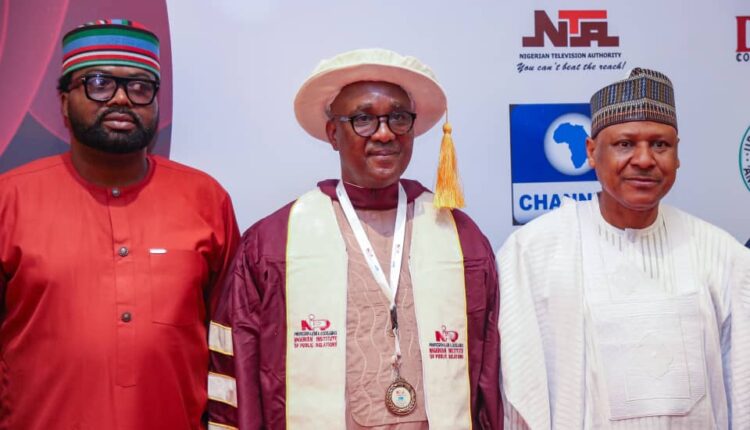Effective Communication by Spokespersons, Key to Government’s Public Acceptance – Reps Speaker
...as NIPR honours him with fellowship
The Speaker of the House of Representatives Rt. Hon. Abbas Tajudeen, has stated that only effective communication by spokespersons could change public perception of the government and its institutions.
This, Speaker Abbas noted, was why the 10th House, under his leadership, has further opened legislative activities in the parliament to the public through citizens’ engagements.
The Speaker made this known at the opening ceremony of the 2nd Nigeria Spokespersons Summit and conferment of honorary fellowship of the Nigerian Institute of Public Relations (NIPR) in Abuja on Tuesday, where he was conferred with an Honorary Fellowship of the institute.
He said: “Effective leadership communication is key to improving public perception of government institutions. In the House, we have taken concrete steps to make our legislative processes more accessible. We now live-stream plenary sessions, publish committee reports in real-time, and provide sign language interpretation during debates.
“For the first time in the history of the National Assembly, the 10th House is conducting annual self-assessments and presenting its scorecard to the Nigerian public. All these demonstrate that our legislature is a vibrant, accessible institution committed to restoring public trust.”
The Speaker appreciated the NIPR leadership and the Federal Ministry of Information and National Orientation for hosting the summit and recognising the efforts in strengthening public communication.
He also noted that the theme of the summit, ‘Integrity and the Evolving Roles of Spokespersons in Leadership Communication’, is both timely and enduring.
Speaker Abbas said: “Today, I wish to address the challenges and opportunities of communicating leadership ideals in our democracy, our shared duty to uphold truth and trust, and the steps we can take together to reinforce good governance.

“After 25 years of uninterrupted democracy, Nigeria has reached a stage where the way we communicate leadership and policy must reflect the maturity of our democratic process. At its core, democracy is not merely the government of the people, by the people, or for the people; democracy, for me, is about government WITH the people.
“This redefinition highlights the need for an active and ongoing partnership between those who govern and those who are governed. This relationship should be built on truth, inclusion, and mutual respect.”
He added: “In an era when misinformation can spread faster than facts and erode public trust, the necessity for honest, clear, and inclusive communication cannot be overstated. Too often, ‘Public Relations’ has been misunderstood as mere spin or propaganda, yet integrity in communication is the cornerstone of a thriving democracy.
“When practitioners and spokespersons adhere to ethical standards, they empower citizens to make informed decisions and hold leaders accountable. Conversely, practices rooted in deception weaken our social contract and foster cynicism.”
Within the legislative arena, the Speaker noted that the House has embraced a commitment to active citizen engagement by bringing parliament closer to the people.
Under the banner of the ‘People’s House,’ he said the 10th House introduced innovative initiatives to demystify the legislative process. “Our ‘State of the House’ engagement forum, first launched in 2024, was the first of its kind by the leadership of the National Assembly. It allowed citizens nationwide to directly interact with House leadership in a live forum, marking a departure from the old approach of speaking to the people from a distance,” he said.
Speaker Abbas also mentioned the youth town halls, to hold twice a year to give young Nigerians — who make up over 60 per cent of the population — a platform to discuss governance and policy. “These engagements have led to concrete outcomes, he said while also noting an annual ‘Legislative Open Week’ to civil society organisations, students, traditional leaders, market women, and others, “thereby fostering greater transparency and accountability.”
The Speaker recalled a particularly memorable moment when he invited a 16-year-old Isabel Anini to preside over a plenary session, “symbolising my commitment to inclusivity and our confidence in the potential of the next generation.”
Speaker Abbas proposed a stronger partnership between the NIPR and the National Assembly, working together to launch public orientation campaigns that explain how policies are created and showcase the important role of parliament. “This initiative could significantly enhance public understanding and reduce negative perceptions. By combining our efforts, we can ensure clear, effective, and inclusive communication,” he said.
The Speaker also recommended that targeted training programmes for press officers and parliamentary committees — guided by global best practices — would help translate complex legislative matters into narratives that resonate with all Nigerians.

